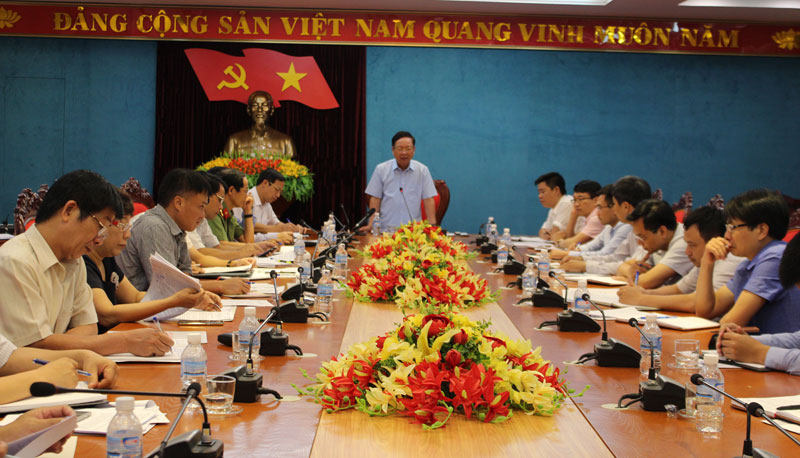
(HBO) - Member of the Party Central Committee and Secretary of Hoa Binh province’s Party Committee Bui Van Tinh had a working session with the provincial Department of Information and Communication on its implementation of political tasks in 2015 – 2017, major tasks in 2018-2020 and some other relevant matters. Attending the meeting were Nguyen Van Toan, Head of the provincial Party Committee’s Commission on Information and Education, and Nguyen Van Chuong, Vice Chairman of the provincial People's Committee.

Bui Van Tinh, Party Central Committee member
and Secretary of the provincial Party Committee, addresses the working session.
In the period 2015-2017, the information and
communication sector has developed strongly. Specifically, the post and
telecommunication industry has improved quality of services, while information
safety and security was insured without network congestion, thus better serving
the direction and management work of Party Committees and administrations at
all level and meeting people’s demand.
As of 2017, the province had 216
postal service points with a network of 26 post offices with 10 secondary mail lines
and 34 third level ones. All communes, wards, towns, and agencies received newspapers
during the day. Networks using optical cable have reached all districts and
cities across the province, and the centres of 209 out of 210 communes,
accounting for 99.5 percent, while 184 out of 210 communes had broadband
internet infrastructure.
The province has 743 thousand
mobile phone subscribers, and 50 percent of the local population using the
Internet. Telecommunication revenue is about 1 trillion VND per year, with over
80 billion VND channelled to the State budget per year.
As much as 100 percent of the communes have accessed
central and local radio and television broadcasting services, while 93 percent
of households have television sets, 80 percent of households watch digital TV
in different forms, and 71 out of 210 communes have their own local system of
loudspeakers.
Regarding key tasks in the coming time, the provincial
Party Committee Secretary requested departments, agencies and press agencies
pay attention to promoting the image and socio-economic potential of the
locality, and organise events effectively.
He asked for more attention to cyber
security issues in order to prevent the abuse of Internet to commit law
violations, and urged the authorised agencies to consider issuing mechanisms
for information provision, improve the quality of press briefings, and hold
emergency press conferences when necessary.
The provincial leader also
suggested holding more meetings online, while improving the operation quality
of websites of sectors and localities, well implementing the regulations on spokesperson,
and re-evaluating the results of coordination with Nhan Dan (People) Newspaper.
Press agencies should increase
activities to popularise the Law on Cyber Security, he said, adding that the
provincial authorities should design plans to enforce the law effectively./.
Hoa Binh province is undergoing a dynamic transformation amid Vietnam’s national digital transition. Building on Poliburo’s Resolution No. 57-NQ/TW on breakthroughs in science, technology, innovation, and national digital transformation, the province has rolled out a wide range of practical action plans. A standout initiative is the "Digital Literacy for All” movement, an effort to ensure that no one is left behind in the digital era.
Hoa Binh province is undergoing a dynamic transformation in the wake of the national digital transformation movement. Building on Resolution No. 57-NQ/TW of the Politburo on breakthroughs in science, technology, innovation, and national digital transformation, the province has implemented a wide range of practical action plans. A standout initiative is the "Digital Literacy for All” movement ambitious effort to ensure that no one is left behind in the digital age.
With a spirit of unity and proactive problem-solving, the Party Committee, the government and the people of Dong Lai Commune (Tan Lac District) have made great strides in implementing the resolutions of the 24th Party Congress of the commune for the 2020 - 2025 term. Focusing on leadership and practical actions, the commune has brought the Party’s resolutions into daily life, creating strong impacts and pushing the local development forward.
Amid the nationwide push for digital transformation, young people in Hoa Binh Province are stepping up as dynamic pioneers, applying technology to enhance Youth Union operations and expand the reach of youth-led initiatives. Through creativity and adaptability, Youth Union organizations at all levels have introduced a series of practical solutions, contributing to modern governance and community development.
In recent years, An Nghia commune, located in Lac Son district, has stepped up administrative reform, focusing on improving the quality and efficiency of its single-window service unit for receiving and processing administrative procedures. These improvements have helped create favourable conditions for local residents and organisations to handle administrative procedures, contributing to the commune’s broader socio-economic development.
The Prime Minister-approved master plan to develop the multi-use value of forests ecosystems through 2030, with a vision to 2050, aims to improve the management and sustainable use of forest resources, create jobs, increase incomes, and improve the living standards of ethnic minorities, people in mountainous and remote areas, forest workers and those living near forests.



